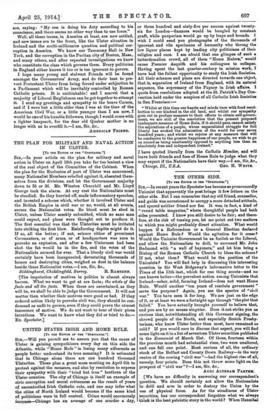THE PLAN FOR MILITARY AND NAVAL ACTION IN ULSTER.
[To rat Relies OF TUN SPECTAreR...1 SIR,—In your article on the plan for military and naval action in Ulster on April 18th you take far too lenient a view of the real object of the Committee of the Cabinet. When the plan for the Exclusion of part of Ulster was announced, many Nationalist Members rebelled against it, absented them- selves from the divisions, and let the Government majority down to 35 or 36. Mr. Winston Churchill and Mr. Lloyd George took the alarm. At any cost the Nationalists must be steadied. So they hurried off, made inflammatory speeches, and invented a scheme which, whether it involved Ulster and the British Empire in civil war or no, would, at all events, secure the Nationalist votes. So blood must be abed in Ulster, unless Ulster meekly submitted, which no sane man could expect, and plans' were thought out to produce it. The first essential was that the Ulsterites must be irritated into striking the first blow. Reinforcing depots might do it. If so, all the better ; if not, seizure either of prominent Covenanters, or of arms, or of headquarters was sure to provoke an explosion, and after a few Ulstermen had been shot the fat would be in the fire, and the votes of the Nationalists secured for ever. That a bloody civil war would certainly have been inaugurated, devastating thousands of homes and destroying cities, weighed as dust in the balance beside these Nationalist votes.—I am, Sir, Ac., Siddinghurst, Chiddingfold, Surrey. R. RAMMER.
[The imputation of motives in politics is almost always barren. "What we want to get at are facts ; the whole of the facts and all the facts. When these are ascertained, as they will be, we shall be able to judge the Government. It will not matter then whether their motives were good or bad. If they ordered action likely to provoke civil war, they should be con- demned as unfit to govern, even if they could prove the utmost innocence of motive. We do not want to hear of their pious intentions. We want to know what they did or tried to do.— ED. Spectator.]


























































 Previous page
Previous page